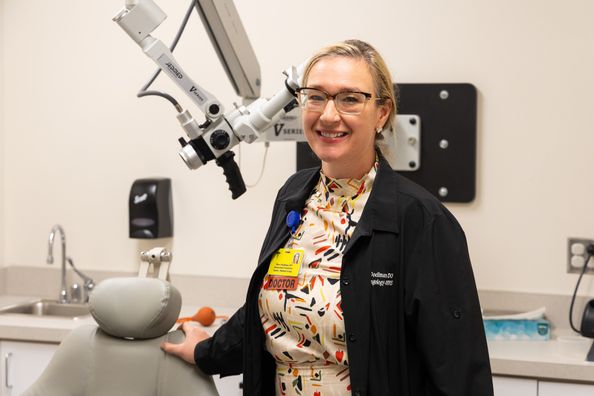In the hustle and bustle of our busy lives, sleep often takes a backseat. We sacrifice precious hours of rest to squeeze in a few more tasks, scrolling through our screens long into the night, and tossing and turning as we try to shut our minds off. But, the truth is, the consequences of not making sleep a priority can have a detrimental impact on your health.
We spoke to Imran Shaikh, MD, Internal Medicine physician with Quincy Medical Group (QMG) who specializes in sleep and obesity medicine. Dr. Shaikh is also a member of the American Academy of Sleep Medicine Public Awareness Committee and was recently elected to be a social media ambassador to help promote awareness. He said sleep should be priority for everyone to improve overall health. Without proper sleep and a focus on sleep hygiene, nearly all other medical issues can worsen.
“Sleep is one of the three pillars of a healthy lifestyle along with good nutrition and regular exercise. Another critical component is management of mood disorders, anxiety, and stress,” he shared.
Dr. Shaikh offers the following information to help you on the path to better sleep.
What is Sleep Hygiene?
Sleep hygiene is a series of healthy sleep habits that can improve your ability to fall asleep and stay asleep. These habits can help improve your sleep health and help resolve feelings of fatigue.
“Sleep is essential; it is one of the critical components of a healthy lifestyle along with nutrition and exercise,” Dr. Shaikh shared. “Healthy sleep improves your health and quality of life in a variety of ways. Healthy sleep involves making the right choices to prioritize and protect sleep.”
Importance of Sleep Health
When you have healthy sleep, you can experience the following:
- Lower your risk for serious health problems, including Type 2 diabetes and heart disease;
- Prevent and manage mental health problems;
- Get sick less often;
- Improve brain health and help prevent Alzheimer’s disease;
- Maximize immunity from vaccines;
- Maintain a healthy weight;
- Improve mood; and/or
- Make better decisions.
Steps to Healthy Sleep Habits
- Keep a consistent sleep schedule. Get up at the same time every day, even on weekends or during vacations;
- Set a bedtime that is early enough for you to get at least 7 – 8 hours of sleep;
- Wait until you’re tired. Don’t go to bed unless you are sleepy;
- If you don’t fall asleep after 20 minutes, get out of bed. Go do a quiet activity without a lot of light exposure. It is especially important to not get on electronics;
- Establish a relaxing bedtime routine;
- Use your bed only for sleep and sex; and
- Make your bedroom quiet and relaxing. Keep the room at a comfortable, cool temperature.
- Limit exposure to bright light in the evenings;
- Turn off electronic devices at least 30 minutes before bedtime;
- Don’t eat a large meal before bedtime. If you are hungry at night, eat a light, healthy snack;
- Exercise regularly and maintain a healthy diet;
- Avoid consuming caffeine in the afternoon or evening;
- Avoid consuming alcohol before bedtime; and
- Reduce your fluid intake before bedtime.
Signs You’re Not Getting Enough Healthy Sleep
You might not think you need more sleep, but your body is probably telling you something different if you:
- Feel a need to drink caffeine throughout the day to stay alert and energized;
- Fall asleep easily during TV shows, car rides, or other activities before bedtime;
- Oversleep on weekends (to catch up from the week);
- Have trouble controlling your appetite or losing weight;
- Find it difficult to focus and concentrate;
- Don’t have as much energy for exercise or playing with children; and/or
- Have less interest in sex.
When to Seek Medical Help
Dr. Shaikh said if you’re having difficulty sleeping or want to improve your sleep, you should try the steps listed in this article. If your sleep problem persists, you should consult your physician or seek medical attention if feelings of fatigue start to affect or interfere with:
- Mood;
- Enjoyment of life;
- Relationships with others;
- Daily activity; and/or
- If you think feelings of fatigue are a result of your medication, please consult your physician.
Dr. Shaikh added that other health concerns can be contributing factors to poor sleep. One of those health issues is weight.
“The correlation between obesity and weight disorders and sleep is often neglected, and poor sleep can lead to difficulty in getting weight off and weight gain,” he explained.
Poor sleep habits/hygiene are usually a contributing factor, but there are many sleep disorders such as obstructive sleep apnea, insomnia, jet lag, and shift work that can contribute. There are also many other medical conditions, vitamin/nutrient deficiencies, and mood disorders that can contribute to fatigue.
Many sleep disorders such as sleep apnea are not being treated adequately because patients have not tolerated treatment in the past, Dr. Shaikh explained.
“There have been significant advancements recently and there are now seven FDA approved treatments for obstructive sleep apnea,” he said. “Patients who have failed treatment before really should get evaluated by a sleep specialist to see if there are any further options for management. The technology around CPAP and masks have changed significantly and the new novel treatments such as Inspire (hypoglossal nerve stimulator) really have changed our ability to manage sleep disorders.”
Learn More
If you have questions about your sleep health, QMG offers multiple resources for sleep including the QMG Sleep Center. If you have questions or concerns, contact your primary care provider or contact our Sleep Medicine team at (217) 222‑6550, ext. We have multiple resources for sleep and if there are any issues, please reach out to your primary care provider to or the sleep center at Quincy Medical Group.
Other resources include:
Health Topics:







